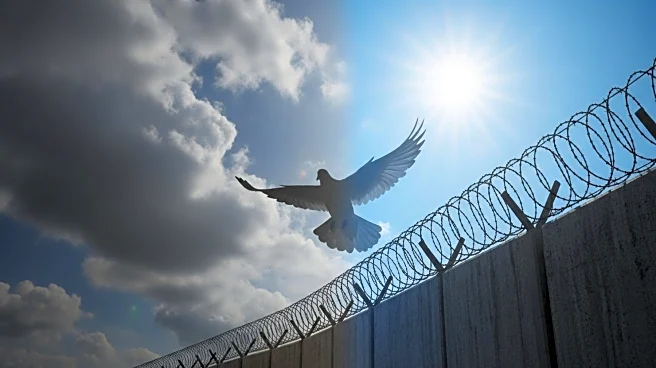What's Happening?
Israel is continuing its military offensive in Gaza as President Trump claims progress in ceasefire negotiations. Israeli tanks are advancing through Gaza City, targeting military infrastructure and militants. The Israeli military reported 140 airstrikes in the last 24 hours, resulting in significant casualties. Hamas has urged Israel to halt airstrikes temporarily to locate two Israeli hostages. Meanwhile, Prime Minister Netanyahu is expected to visit the White House to discuss a ceasefire plan with President Trump, who has proposed a 21-point plan for immediate ceasefire and hostages' release.
Why It's Important?
The ongoing conflict in Gaza has significant implications for regional stability and international relations. The military offensive has resulted in substantial civilian casualties, raising humanitarian concerns and prompting calls for a ceasefire. President Trump's involvement in negotiations highlights the U.S.'s role in mediating Middle East conflicts. The situation may affect diplomatic relations between Israel and other countries, influencing peace prospects and geopolitical dynamics. The conflict also underscores the challenges of balancing military objectives with humanitarian considerations.
What's Next?
Ceasefire negotiations are expected to continue, with potential diplomatic interventions from international stakeholders. The outcome of discussions between Netanyahu and Trump may influence the trajectory of the conflict and regional peace efforts. Humanitarian aid and support for affected civilians may become a focal point for international organizations. The situation could lead to increased pressure on Israel to address humanitarian concerns and pursue diplomatic solutions.
Beyond the Headlines
The conflict in Gaza highlights broader ethical and humanitarian dimensions, including the impact on civilian populations and the challenges of achieving lasting peace. The situation may influence long-term regional dynamics, affecting geopolitical alliances and peace prospects. The role of international mediators, including the U.S., may be scrutinized in terms of effectiveness and impartiality in conflict resolution.








